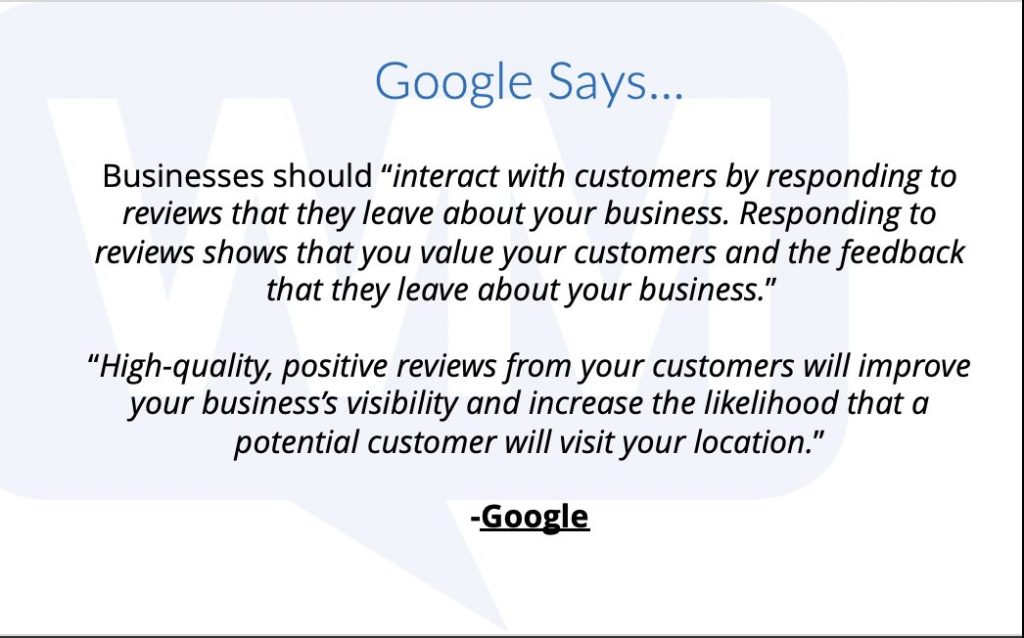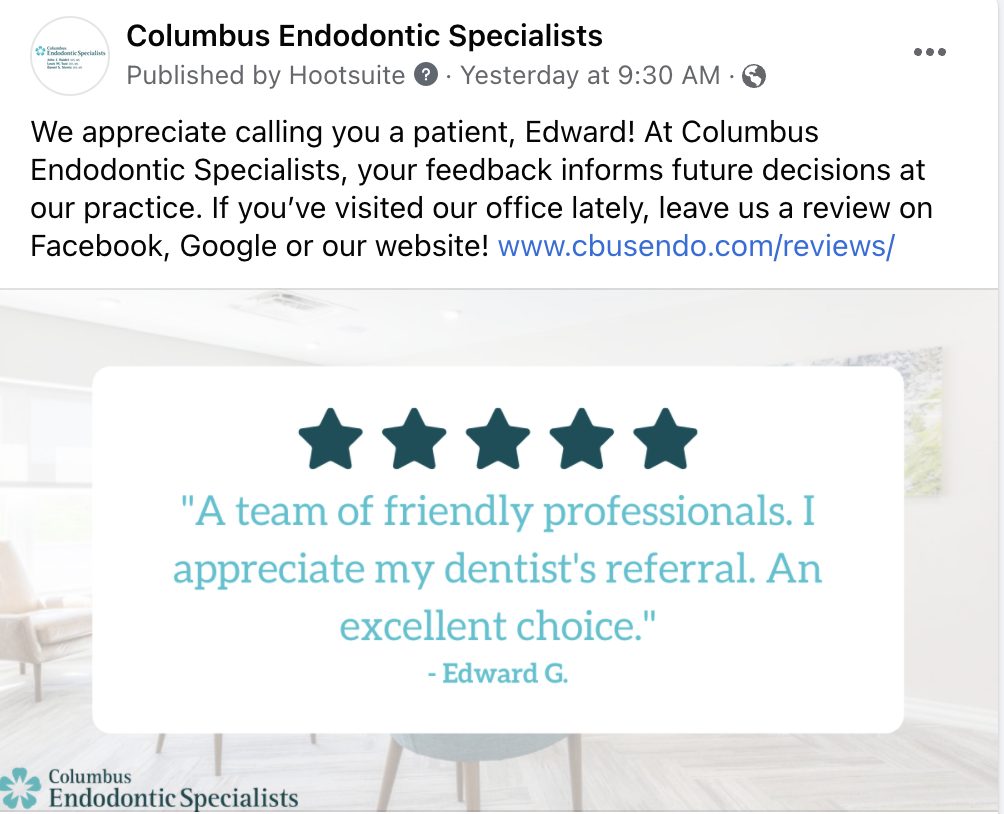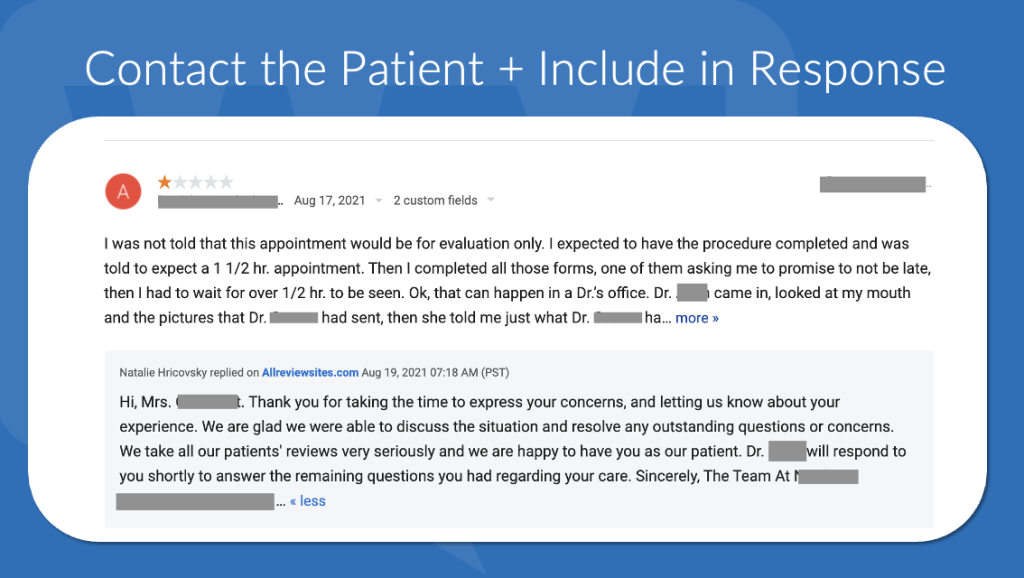You’ve got a strategic review response plan in place. Now, you must focus on how to best respond to the reviews coming into your practice.
Today, our Whiteboard Marketing team explains how to effectively respond to patient reviews — and how important responding to reviews is for the success of your dental practice.
The Benefits of Patient Reviews
Asking for online patient reviews has many positive benefits. For one, 90% of patients search online for a dentist. Ninety-four percent of patients use online reviews to evaluate providers, and 72% look at reviews as their first step to finding a new provider or to confirm practice credentials.
Reviews for Search Engine Optimization
Businesses with a high level of four- and five-star reviews have a much higher level of respect from search engines. In other words, positive reviews make you look credible, authoritative and help you show up for when a prospective patient searches for a dentist near them.
Reviews that incorporate keywords of services your practice provides are also great for search engine optimization. Google repeatedly sees these keywords and recognizes them as a procedure you offer. When customers then search for dental cleanings near them, you have a higher likelihood of popping up organically.
Using Patient Reviews in Your Marketing
If your practice is committed to asking for reviews from your patients, you’re likely generating excellent, authentic review content for your Google, Facebook and Healthgrades profiles — and likely even on your own website, too. Since you’re proud of the feedback you receive, you can also promote them via live streaming reviews on your website, Facebook page and sharing them in patients’ emails.
Best Practices for Responding to Patient Reviews
As a practice that respects your patients, it’s critical to respond to every review since you asked them to take the time to provide feedback. Even negative reviews, no matter how much they may frustrate your team, deserve a fair, courteous response. Responding to reviews builds trust and credibility with both patients and with Google, and helps improve your online ranking.
Rules of Review Responses
The three key rules when responding to positive reviews are:
- Respond promptly
- Thank the reviewer for their feedback
- Repeat or elaborate on one of the positive statements in the patient’s review, as this helps with search engine optimization
Whether a patient posts a positive or negative review, they still took the time to provide feedback. Your thankful response demonstrates your practice’s philosophy to current and future patients.
Negative Reviews
As a practice, maybe you’re scared to ask for reviews because you’re concerned about the negative ones. However, negative reviews present a unique marketing opportunity for several reasons:
- Negative reviews are an opportunity to convey your practice philosophy and stance on specific areas of miscommunication in a HIPAA-compliant way.
- In a Mack Collier study, 33% of patients who received a response from a business or practice after posting a negative comment turned around and posted a positive review
- In this same study, 34% of patients deleted the original negative review
Rules of Responding to Negative Reviews
When responding to a negative review, the most important thing to remember is not to take the review personally. Don’t come off as defensive or mad in your responses. Here’s five crucial response rules:
- Acknowledge that the patient took time to review the practice and that you take every review seriously.
- Communicate a sincere, authentic voice and address the concerns raised in the review
- Educate the public when possible
- Do not address the patient or patient’s specific situation directly due to HIPAA
- Take the conversation offline, if need be
You may wonder if you can just get negative reviews removed from Google. However, this is an incredibly difficult process and the rules dictating if a review can get removed is quite strict. Learning to respond to negative reviews and turn them into a positive opportunity is a much more effective long-term strategy.
If you continue to get negative reviews or see multiple reviews about the same issue, it’s an opportunity to look at the pattern and see if there is anything you may need or want to change internally. This is another example of how negative reviews can ultimately benefit your practice, as you can improve your services based on this feedback.
Need Help with Your Review and Reputation Management Strategy?
At Whiteboard Marketing, reviews and reputation management is a fundamental part of our digital marketing strategy. If your practice needs any assistance with developing a sustainable reviews program, download our How to Build a Patient Review Program for Your Practice worksheet or contact us at [email protected].









